Dante: The Divine Comedy
Purgatorio Cantos I-VII
Authored and translated by A. S. Kline © Copyright 2000, All Rights Reserved.
This work may be freely reproduced, stored and transmitted, electronically or otherwise, for any non-commercial purpose. Conditions and Exceptions apply.
Contents
- Purgatorio Canto I:1-27 Dante’s Invocation and the dawn sky
- Purgatorio Canto I:28-84 The Poets meet Cato
- Purgatorio Canto I:85-111 Cato tells Virgil to bathe Dante’s eyes
- Purgatorio Canto I:112-136 Virgil obeys
- Purgatorio Canto II:1-45 The Angel of God
- Purgatorio Canto II:46-79 The Crowd of Souls
- Purgatorio Canto II:79-114 Casella, the musician
- Purgatorio Canto II:115-133 Cato exhorts the spirits to go on
- Purgatorio Canto III:1-45 Virgil stresses the limitations of knowledge
- Purgatorio Canto III:46-72 The Excommunicated
- Purgatorio Canto III:73-102 They are troubled by Dante’s shadow
- Purgatorio Canto III:103-145 Manfred
- Purgatorio Canto IV:1-18 The unity of the soul
- Purgatorio Canto IV:19-51 The narrow path.
- Purgatorio Canto IV:52-87 The sun’s arc south of the equator
- Purgatorio Canto IV:88-139 Belacqua
- Purgatorio Canto V:1-63 The Late-Repentant
- Purgatorio Canto V:64-84 Jacopo del Cassero
- Purgatorio Canto V:85-129 Buonconte da Montefeltro
- Purgatorio Canto V:130-136 Pia da Tolomei
- Purgatorio Canto VI:1-24 The spirits crowd round
- Purgatorio Canto VI 25-48 Virgil on the efficacy of prayer
- Purgatorio Canto VI:49-75 Sordello
- Purgatorio Canto VI:76-151 Dante’s speech on the sad state of Italy
- Purgatorio Canto VII:1-39 Virgil declares himself to Sordello
- Purgatorio Canto VII:40-63 Sordello explains the rules for ascent
- Purgatorio Canto VII:64-136 The Valley of the Negligent Rulers
Purgatorio Canto I:1-27 Dante’s Invocation and the dawn sky
The little boat of my intellect now sets sail, to course through gentler waters, leaving behind her a sea so cruel. And I will speak of that second region, where the human spirit is purged, and becomes fit to climb to Heaven. But, since I am yours, O sacred Muses, here let dead Poetry rise again, and here let Calliope sound, a moment, accompanying my words with that mode, of which the Pierides felt the power, so that they despaired of pardon.
The sweet colour of eastern sapphire, that gathered on the skies clear forehead, pure as far as the first sphere, restored delight to my eyes, as soon as I had issued from the dead air, which constrained my eyes and heart. The lovely planet that encourages us to love, was making the whole east smile, veiling the Fishes that escorted her. I turned to the right, and fixed my mind on the southern pole, and saw four stars, never seen, until now, except by the first peoples.
The sky seemed to be joyful at their fires. O widowed northern region, denied the sight of them!
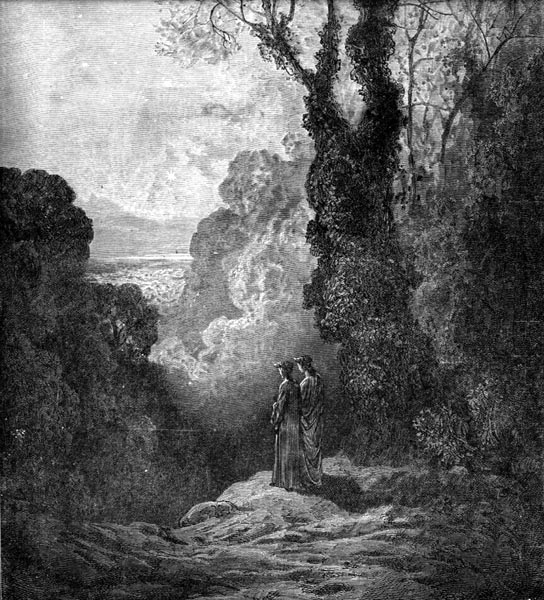
“The lovely planet that encourages us to love, was making the whole east smile, veiling the Fishes that escorted her.” (Purgatorio I: 19—21)
Purgatorio Canto I:28-84 The Poets meet Cato
When I had left gazing at them, and turned a little towards the other pole, there, where Bootës had already vanished, I saw a solitary old man, with a face worthy of such great reverence, that no son owes his father more. He wore his beard long, flecked with white, like his hair, of which a double strand fell to his chest. The rays, of the four sacred stars, filled his face, with such brightness, that I saw him as if the sun were in front of him.
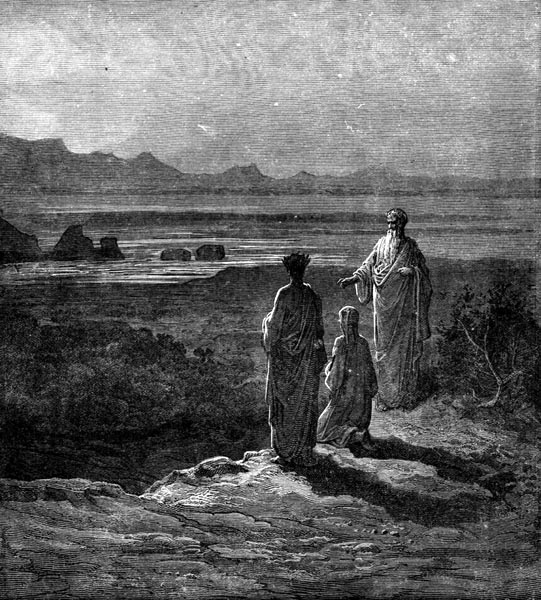
“I saw a solitary old man, with a face worthy of such great reverence, that no son owes his father more.” (Purgatorio I: 31—33)
Stirring that noble plumage, he said: ‘Who are you, who have fled the eternal prison, against the dark stream? Who has led you, or who was a light to you, issuing out of that profound night, that always blackens the infernal valley? Are the laws of the abyss shattered, or is there some new counsel taken in Heaven that you come to my mountain, being damned?’
Then, my leader took hold of me, and made me do reverence with my knees and forehead, using his words and hand. Then he replied: ‘I did not come of my own will. A Lady came down from Heaven, and, because of her prayers, I helped this man, with my companionship. But since it is your wish that more be told about our true state, it cannot be my wish to deny you. He has never witnessed the last hour, but, because of his folly, was so near it, that there was little time left for him to alter. As I said, I was sent to rescue him, and there was no other path but this, along which I have come.
I have shown him all the sinful people, and now intend to show him those spirits that purge themselves, in your care. It would be a long tale to tell, how I have brought him here: virtue descends from above, that helps me to guide him, to see and to hear you. Now, let it please you to grace his coming here: he seeks freedom, which is so dear to us, as he knows, who gives his life for it. You know: since death was not bitter to you in Utica for its sake, where you left the body that will shine so bright, at the great day.
The eternal law is not violated by us, since he lives, and Minos does not bind me: but I am of the circle where the chaste eyes of your Marcia are, who in her aspect begs you, O sacred one, to hold her as your own: lean towards us, for love of her. Allow us to go through your seven regions: I will report, to her, our gratitude to you, if you deign to be mentioned there below.’
Purgatorio Canto I:85-111 Cato tells Virgil to bathe Dante’s eyes
He replied, then: ‘Marcia was so pleasing to my eyes while I was over there, that I performed every grace she asked of me. Now that she is beyond the evil stream, she can move me no longer, by the law that was made when I issued out. But there is no need for flattery, if a heavenly lady moves and directs you: let it be sufficient that you ask me in her name.
Go, and see that you tie a smooth rush round this man, and bathe his face, so that all foulness is wiped away, since it is not right to go in front of the first minister of those who are in Paradise, with eyes darkened by any mist.
This little island nurtures rushes, in the soft mud, all round it, from deep to deep, where the wave beats on it. No other plant that puts out leaves, or stiffens, can live there, because it would not give way to the buffeting. Then, do not return this way: the sun, that is now rising, will show you where to climb the mountain, in an easier ascent.’
So he left: and I rose without speaking, and drew back towards my leader, and fixed my eyes on him.
Purgatorio Canto I:112-136 Virgil obeys
He began: ‘Son, follow my steps: let us turn back, since the plain slopes down, this way, to its low shore.’ The dawn was vanquishing the breath of morning, which fled before her, so that, from afar, I recognised the tremor of the sea.
We walked along the solitary plain, like those, who turn again towards a lost road, and seem to go in vain, until they reach it. When we came where the dew fights with the sunlight, being in a place where it disperses slowly in the cool air, my Master gently placed both hands, outspread, on the sweet grass: at which, I who understood his intention, raised my tear-stained face towards him: there he made my true colour visible, that Hell had hidden.
Then we came onto the deserted shore that never saw a man sail its waters, who, could, afterwards, experience his return. There he tied the rush around me, as the other wished: O marvellous: as he pulled out the humble plant, so it was suddenly replaced, where he tore it.
Purgatorio Canto II:1-45 The Angel of God
The sun, had already reached the horizon, whose meridian circle, at the zenith, covers Jerusalem: and night, that circles opposite him, was rising, out of Ganges, with the Scales, Libra, that fall from night’s hand, when the days shorten: so that, where I was, the pale and rosy cheeks of beautiful Aurora, through age, were turned deep orange.
We were still near the ocean, like people who think about their journey, who go on in spirit, but remain in body; and behold, as Mars reddens through the heavy vapours, low in the west, over the waves, at the coming of dawn, so a light appeared, and may I see it yet, coming over the sea, so quickly, that no flight equals its movement, and when I had taken my eyes from it for a moment to question my guide, I saw it, once more, grown bigger and brighter. Then something white appeared on each side of it, and, little by little, another whiteness emerged from underneath it.
My Master still did not speak a word, until the first whitenesses were seen to be wings: then, when he recognised the pilot clearly, he cried: ‘Kneel, bend your knees: behold the Angel of God: clasp your hands: from now on you will see such ministers. See how he disdains all human mechanism, not needing oars, or any sails but his wings, between such far shores. See how he has them turned towards the sky, beating the air, with eternal plumage, that does not moult like mortal feathers.’
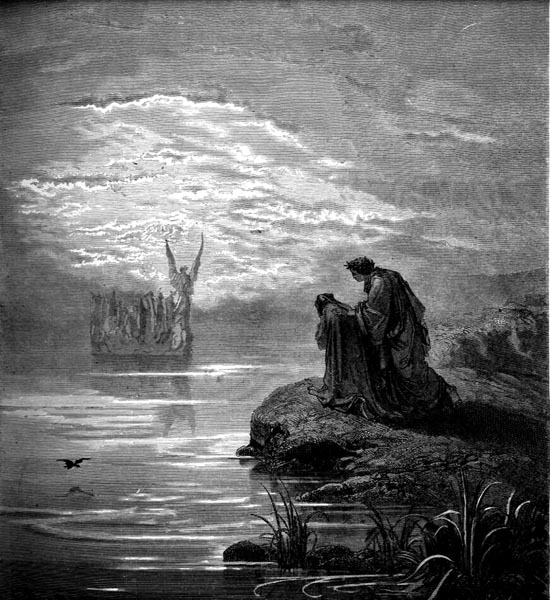
“…when he recognised the pilot clearly, he cried: ‘Kneel, bend your knees: behold the Angel of God…’” (Purgatorio II: 27—29)
Then as the divine bird approached, nearer and nearer, to us, it appeared much brighter, so that my eyes could not sustain its closeness: but I looked down, and it came towards the shore, in a vessel so quick and light that it skimmed the waves. At the stern stood the celestial steersman, so that blessedness seemed written in his features, and more than a hundred souls sat inside.
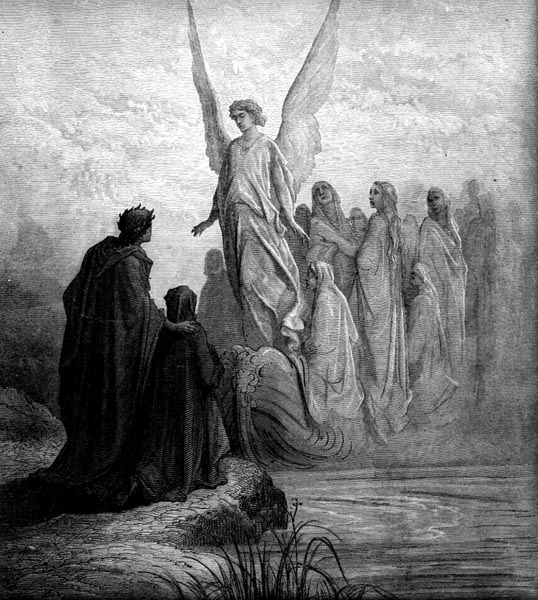
“…blessedness seemed written in his features…’” (Purgatorio II: 44)
Purgatorio Canto II:46-79 The Crowd of Souls
They all sang, together, with one voice: ‘In exitu Israel de Aegypto: When Israel went out of Egypt,’ and the rest of the psalm that comes after. Then he made the sign of the sacred cross towards them, at which they all flung themselves on shore, and, as quickly as he came, he departed.
The crowd that were left seemed unfamiliar with the place, looking round like those who experience something new. The sun, who had chased Capricorn from the height of heaven with his bright arrows, was shooting out the light on every side, when the new people raised their faces towards us, saying: ‘If you know it, show us the way to reach the Mount.’ And Virgil answered: ‘You think, perhaps, we have knowledge of this place, but we are strangers, as you are. We came, just now, a little while before you, by another route so difficult and rough, that the climbing now will seem like play to us.’
The spirits, who had noticed I was still alive, by my breathing, wondering, grew pale, and as the crowd draws near the messenger, who carries the olive-branch, and no one is wary of trampling on others, so those spirits, each one fortunate, fixed their gaze on my face, almost forgetting to go and make themselves blessed.
I saw one of them move forward to embrace me, with such great affection, that he stirred me to do the same.
Purgatorio Canto II:79-114 Casella, the musician
O vain shades, empty except in aspect! My hands met three times behind him, and returned, as often, empty, to my breast. I paled, with wonder, I believe, at which the shade smiled, and drew back, and I hurried forward, following. It asked me, gently, to pause: then I knew who it was: and begged him to stop a while, and speak to me. He replied: ‘Just as I loved you in the mortal body, so I love you, freed: so I stay: but you, where are you going?’
I said: ‘My Casella, I make this journey, in order to return here again, where I am, but how have so many hours been stolen from you?’ And he to me: ‘If he who carries whom he pleases, when he pleases, has denied me this crossing many times, no wrong is done to me, since his will is full of justice. In truth, for three months past, since the beginning of the Jubilee, he has taken, in all peace, those who wish to enter. So I, who was on the shore where Tiber’s stream becomes saltwater, was accepted by him, in kindness. He has set his winged course to that river-mouth now, because those who do not sink to Acheron, are always gathering there.’
And I: ‘If some new law has not taken your memory, or your skill in that song of love, that used to calm all my desires, may it please you to console my spirit a while, with it, my spirit, that, coming here in its own person, suffers so.’ He then began to sing: ‘Amor che nella mente mi ragiona: Love that, in my mind, discourses with me,’ so sweetly, that the sweetness of it sounds, in me, yet.
Purgatorio Canto II:115-133 Cato exhorts the spirits to go on
My Master and I, and the people who were with him, seemed so delighted, that they thought of nothing else. We were all focused and intent on his notes: when, behold, the venerable old man, cried: ‘What is this, tardy spirits? What negligence, what idling is this? Run to the mountain, and strip the scales from your eyes, that prevent God being revealed to you.’
As doves, gathering corn or seeds, collected at their meal, quietly, and without their usual pride, stop pecking, straight away, if anything appears they are afraid of, since they are troubled by a more important concern, so I saw that new crowd leave the singing, and move towards the hillside, like those who go, but do not know where they will emerge: nor was our departure slower.
Purgatorio Canto III:1-45 Virgil stresses the limitations of knowledge
Although their sudden flight was scattering them over the plain, I drew close to my faithful companion, turning to the mountain, where reason examines us: and how would I have fared without him? Who would have brought me to the Mount?
He seemed to me to be gnawed by self-reproach. O clear and noble conscience, how sharply a little fault stings you! When his feet had slowed from that pace that spoils the dignity of every action, my mind, which was inwardly focused before, widened its intent, as if in search, and I set my face towards the hillside that rises highest towards heaven from the water.
The sunlight, that flamed red behind us, was broken, in front of me, in that shape in which I blocked its rays. I turned aside from fear of being abandoned, seeing the earth darkened, only in front of me. But my comforter began speaking to me, turning straight round: ‘Why so mistrustful? Do you think you are not with me, or that I do not guide you?
It is already evening, there, where the body with which I cast a shadow, lies buried: Naples has it, and it was taken from Brindisi. Now, if no shadow goes before me, do not wonder at that, any more than at the heavenly spheres, where one does not hide the light of any other. That power, that does not will that its workings should be revealed to us, disposes bodies such as these to suffer torments, fire and ice. He is foolish who hopes that our reason may journey on the infinite road, that one substance in three persons owns. Stay, content, human race, with the ‘what’: since if you had been able to understand it all, there would have been no need for Mary to give birth: and you have seen the fruitless desire, granted to them as an eternal sorrow, of those whose desire would have been quenched, I mean Aristotle, Plato, and many more.’ And here he bent his head, and said nothing more: remaining troubled.
Purgatorio Canto III:46-72 The Excommunicated
Meanwhile we reached the mountain’s foot: there we found the cliff was so steep that even nimble feet would be useless. The most desolate, and the most solitary track, between Lerici and Turbia, in Liguria, is a free and easy stair compared to that. My Master, halting his feet, said: ‘Now, who knows which way the cliff slopes, so that he who goes without wings, may climb?’ And while he kept his eyes downwards, searching out the way in his mind, and while I was gazing up, across the rocks, a crowd of spirits, appeared to me, on the left, who moved their feet towards us, but did not seem to, they came so slowly.
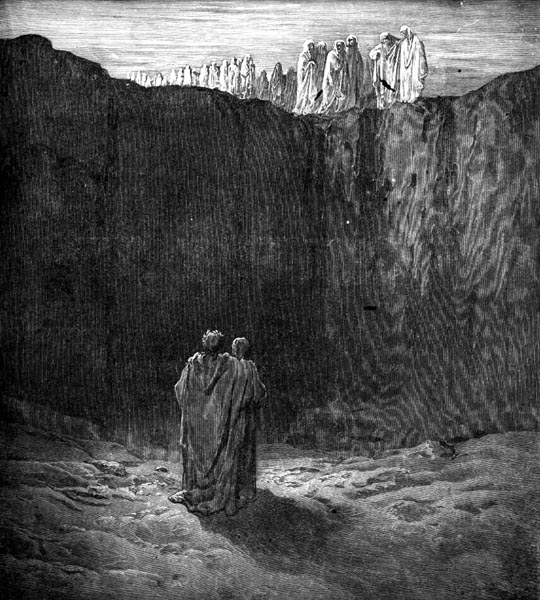
“…while I was gazing up, across the rocks, a crowd of spirits, appeared to me, on the left, who moved their feet towards us, but did not seem to, they came so slowly.” (Purgatorio III: 56—58)
I said: ‘Master, raise your eyes, behold one there who will give us advice, if you cannot give it yourself.’ He looked at them, and with a joyful face, answered: ‘Let us go there, since they come slowly, and confirm your hopes, kind son.’ That crowd were still as far off, after a thousand paces of ours I mean, as a good thrower would reach, with a stone, from the hand, when they all pressed close to the solid rock of the high cliff, and stood, motionless together, as people stop to look around, who travel in fear.
Purgatorio Canto III:73-102 They are troubled by Dante’s shadow
Virgil began: ‘O spirits, who ended well, already chosen: by the same peace that, I believe, is awaited by you all, tell us where the mountain slopes allow us to go upwards, since lost time troubles those most, who know most.’ As sheep come out of their pen, in ones, twos, and threes, and others stand timidly, with eyes and nose towards the ground, and what the first does, the others also do, huddling to her if she stands still, foolish and quiet, and not knowing why, so I saw, then, the head of that fortunate flock, of modest aspect, and dignified movement, make a move to come forward.
When those in front saw the light on the hillside, broken, on my right, by my shadow, falling from me as far as the rock, they stopped, and drew back, a little: and all the others that came after them, did the same, not understanding why. My Master said: ‘Without your asking, I admit, to you, that this is a human body that you see, by which the sunlight is broken on the ground. Do not wonder, but believe, that he does not try to climb this wall, without the help of power that comes from Heaven.’ And the worthy people said: ‘Turn, then, and go in front of us,’ making a gesture with the backs of their hands.
Purgatorio Canto III:103-145 Manfred
And one of them began to speak: ‘You, whoever you are, turn your face, as we go, and think if you ever saw me over there.’ I turned towards him, and looked hard: he was blond and handsome, and of noble aspect, but a blow had split one of his eyebrows.
When I had denied, humbly, ever seeing him, he said: ‘Now look’, and he showed me a wound at the top of his chest. Then, smiling, he said: ‘I am Manfred, grandson of the Empress Constance: and I beg you, when you return, go to my lovely daughter, Costanza, mother of James and Frederick, Sicily’s and Aragon’s pride, and tell her this truth, if things are said differently there. After my body had been pierced, by two mortal wounds, I rendered my spirit to him, who pardons, willingly. My sins were terrible, but infinite goodness has such a wide embrace it accepts all those who turn to it. If the Bishop of Cozenza, who was set on by Clement to hound me, had read that page of God’s rightly, the bones of my corpse would still be at the bridgehead, by Benevento, under the guardianship of the heavy cairn.
Now, the rain bathes them, and the wind moves them, beyond the kingdom, along the River Verde, where he carried them, a lume spento, with quenched tapers. But no one is so lost by the malediction, of that excommunication, that eternal love may not turn back to him, as long as hope is green. It is true that those who die, disobedient to the Holy Church, even though they repent at the end, must remain outside this bank for thirty times the duration of their life of insolence, unless such decree is shortened by the prayers of the good.
See now, if you can give me delight, by telling my good Costanza how you saw me, and also of my ban, since much benefit arises, here, through the prayers of those who are still over there.’
Purgatorio Canto IV:1-18 The unity of the soul
When the soul is wholly centred, on one of our senses, because of some pleasure or pain, that it comprehends, it seems that it pays no attention to its other powers, and this contradicts Plato’s error, that has it, that one soul is kindled on another, inside us. So, when something is seen or heard, that holds the soul’s attention strongly fixed, time vanishes and man is unaware of it, since one power is that which notices time, and another that which occupies the entire soul: the former is as if constrained, the latter free.
I had a genuine experience of this, while listening to that spirit and marvelling, since the sun had climbed fully fifty degrees, and I had not noticed it, when we came to where those souls, with a single voice, cried out to us: ‘Here is what you wanted.’
Purgatorio Canto IV:19-51 The narrow path.
When the grape is ripening, the peasant often hedges up a larger opening, with a little forkful of thorns, than the gap through which my leader climbed, and I behind him, two alone, after the group had parted from us. You can walk at Sanleo, near Urbino, and descend to Noli, near Savone: you can climb Mount Bismantova, south of Reggio, up to the summit, on foot: but here a man had to fly: I mean with the feathers and swift wings of great desire, behind that leader, who gave me hope, and made himself a light.
We were climbing inside a rock gully, and the cliff pressed against us on either side, and the ground under us needed hands as well as feet. Once we were on the upper edge of the high wall, out on the open hillside, I said: ‘My Master, which way should we go?’ And he to me: ‘Do not let your steps drift downward, always win your way, up the mountain, behind me, until some wise escort appears to us.’
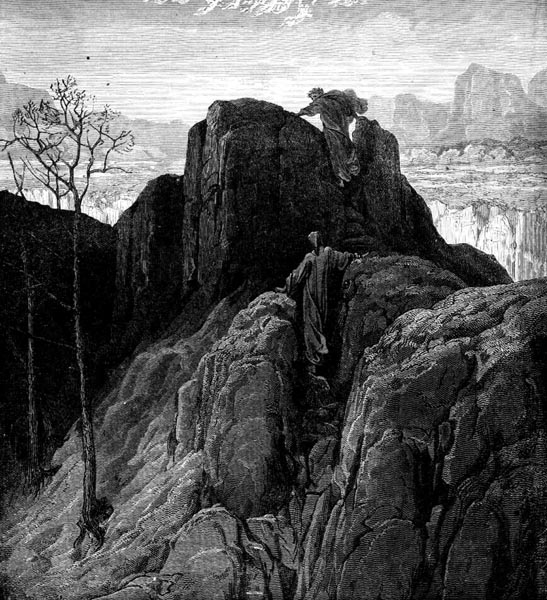
“…the ground under us needed hands as well as feet.” (Purgatorio IV: 31, 32)
The summit was so high it was beyond my sight, and the slope far steeper than the forty-five degrees a line from mid-quadrant makes with the circle’s radius. I felt weary, and began to say: ‘O sweet father, turn and see how I am left behind if you do not stop.’ He said: ‘My son, make yourself reach there,’ showing me a terrace, a little higher up, that goes round the whole mountain, on that side. His words spurred me on, greatly, and I forced myself on, so far, creeping after him, that the ledge was beneath my feet.
Purgatorio Canto IV:52-87 The sun’s arc south of the equator
There we both sat down, turning towards the east, from which we had climbed: since it often cheers men to look back. I first fixed my eyes on the shore below, then raised them to the sun, and wondered at the fact that it struck us on the left side. The poet saw clearly that I was totally amazed at that chariot of light, rising between us, and the north. At which he said to me: ‘If that mirror, the sun, that reflects the light, from above, downwards, were in Castor and Pollux, the Gemini, you would see the Zodiac, glowing round him, circle still closer to the Bears, unless it wandered from its ancient track.
If you wish the power to see that, for yourself, imagine Mount Zion, at Jerusalem, and this Mountain, placed on the globe so that both have the same horizon, but are in opposite hemispheres: by which you can see, if your intellect understands quite clearly, that the sun’s path, that Phaëthon, sadly, did not know how to follow, has to pass to the north here, when it passes Zion on the south.’
I said: ‘Certainly, Master, I never saw as clearly as I now discern, there, where my mind seemed at fault, that the median circle of the heavenly motion, that is called the Equator in one of the sciences, and always lies between the summer and the winter solstice, is as far north here, for the reason you say, as the Hebrews saw it, towards the hot countries.
But if it please you, I would like to know, willingly, how far we have to go, since the hillside rises higher than my eyes can reach.’
Purgatorio Canto IV:88-139 Belacqua
And he to me: ‘This mountain is such, that it is always troublesome at the start, below, but the more one climbs up, the less it wearies. So, you will feel at the end of this track, when it will seem so pleasant to you, that the ascent is as easy as going downstream, in a boat. Hope to rest your weariness there. I answer you no more, and this I know is true.’
And when he had his say, a voice sounded nearby: ‘Perhaps, before then, you may have need to sit.’ At the sound of it, we each turned round, and saw a great mass of rock on the left, that neither he nor I had noticed before. We drew near it: and there were people lounging in the shade, behind the crag, just as one settles oneself to rest, out of laziness. And one of them, who seemed weary to me, was sitting and clasping his knees, holding his head down low, between them.
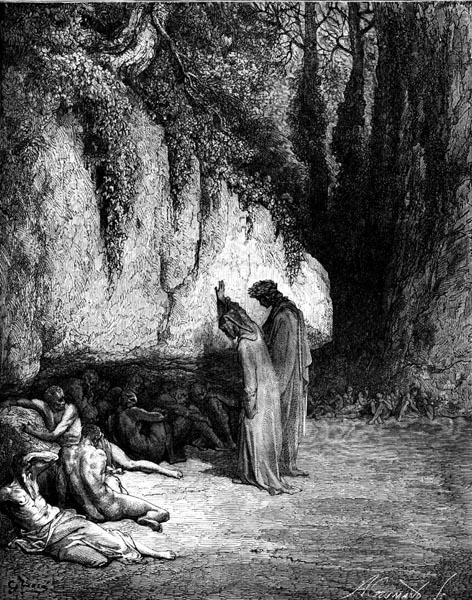
“…there were people lounging in the shade, behind the crag, just as one settles oneself to rest, out of laziness.” (Purgatorio IV: 100—102)
I said: ‘O my sweet sire, set your eyes on that one, who appears lazier than if Sloth were his sister.’ Then he turned to us, and listened, only lifting his face above his thigh, and said: ‘Now go on up, you who are so steadfast.’ Then I knew who he was, and that effort, which still constrained my breath a little, did not prevent me going up to him, and, when I had reached him, he hardly lifted his head, to say: ‘Have you truly understood why the sun drives his chariot to the left?’ His indolent actions and the brief words, moved me to smile a little: then I began: ‘Belacqua, I do not grieve for you now: but tell me why you are sitting here? Are you waiting for a guide, or have you merely resumed your former habit?’
And he: ‘Brother, what use is it to climb? God’s winged Angel, who sits at the gate, will not let me pass through to the torments. First the sky must revolve, round me, outside, for as long a time as it did in my life: because I delayed my sighs of healing repentance to the end: unless, before then, some prayer aids me, that might rise from a heart that lives in grace: what is the rest worth, that is not heard in Heaven?’
And the poet was already climbing, in front of me, saying: ‘Come on, now, you see the sun touches the zenith, and night’s feet have already run from the banks of the Ganges to Morocco.’
Purgatorio Canto V:1-63 The Late-Repentant
I had already parted from those shadows, and was following my leader’s footsteps, when someone, behind me, pointing his finger, called out: ‘See, the light does not seem to shine, on the left of him, below, and he seems to carry himself like a living man.’ I turned my eyes, at the sound of these words, and saw them all gazing in wonder, at me alone, at me alone and at the broken sunlight.
My Master said: ‘Why is your mind so ensnared that you slacken pace? What does it matter to you what they whisper here? Follow me close behind, and let the people talk: stand like a steady tower, that never shakes at the top, in the blasts of wind: since the man, in whom thought rises on thought, sets himself back, because the force of the one weakens the other.’ What could I answer, except: ‘I come?’ This I said, blushing a little, with that colour that often makes someone worthy of being pardoned.
And, across the mountain slope, meanwhile, a crowd, in front of us, a little, came, chanting the Miserere, alternately, verse by verse. When they saw I allowed no passage to the sun’s rays because of my body, they changed their chant to a long, hoarse ‘Oh!’: and two of them ran to meet us as messengers and demanded: ‘Make us wise to your state.’ And my Master said: ‘You can go back, and tell those who sent you, that this man’s body is truly flesh. If they stopped at seeing his shadow, as I think, that answer is enough: let them honour him, and he may be precious to them.’
I never saw burning mists at fall of night, or August clouds at sunset split the bright sky, so quickly, but they in less time, returned, up the slope, and arrived there while the others wheeled round us, like a troop of cavalry riding with loosened reins. The poet said: ‘This crowd that presses us is large, and they come to beg you, but go straight on, and listen while you go.’
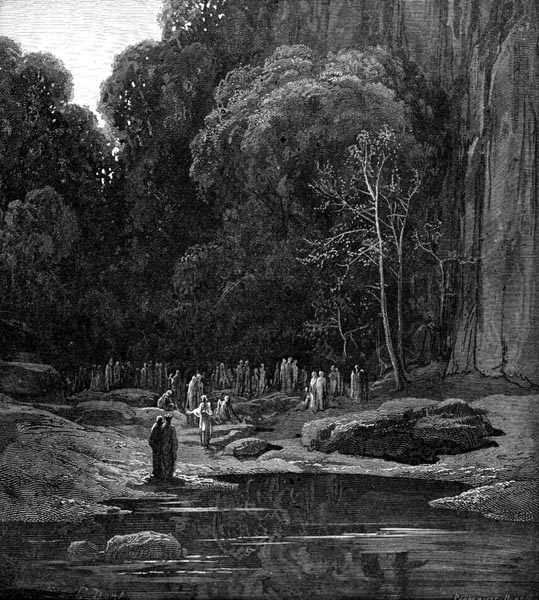
“The poet said: ‘This crowd that presses us is large, and they come to beg you, but go straight on, and listen while you go.’” (Purgatorio V: 42—44)
They came, crying: ‘O spirit, who goes to joy, with the limbs you were born with, pause your steps a while. Look and see if you ever knew one of us, so that you can bear news of him, over there: oh, why are you leaving?: oh, why do you not stay? We were all killed by violence, and were sinners till the last hour: then light from Heaven warned us, so that, repenting and forgiving, we left life reconciled with God, who fills us with desire to see him.’
And I: ‘However much I gaze at your faces, I recognise no one: but if I can do anything to please you, spirits born for happiness, speak, and I will do it, for the sake of that peace, which makes me chase after it, from world to world, following the steps of such a guide.’
Purgatorio Canto V:64-84 Jacopo del Cassero
And one began to speak: ‘Each of us trusts in your good offices, without your oath, if only lack of power does not thwart your will. So, I, who merely speak before others do, beg you to be gracious to me, in your prayers, at Fano, if ever you see that country again, that lies between Romagna, and Charles the Second’s Naples, so that the good may be adored through me, and I can purge myself of grave offence. I sprang from there, but the deep wounds from which the blood flowed, that bathed my life, were dealt me in the embrace of Paduans, those Antenori, there, where I thought that I was safest. Azzo of Este had it done, he who held a greater anger against me, than justice merited.
Though, if I had fled towards La Mira, when I was surprised at Oriaco, I would still be over there, where men breathe. I ran to the marshes, and the reeds, and mire, swamped me so that I fell, and there I saw a pool grow on the ground, from my veins.’
Purgatorio Canto V:85-129 Buonconte da Montefeltro
Then another said: Oh, so the desire might be satisfied, that draws you up the high mountain, aid mine with kind pity. I was of Montefeltro, I am Buonconte: Giovanna has no care for me, nor the others, so I go among these, with bowed head.’ And I to him: ‘What violence or mischance made you wander so far from Campaldino, that your place of burial was never known?’ He replied: ‘Oh, at the foot of Casentino, a stream crosses it, called the Archiano, that rises in the Apennines, above the Monastery of Camoldoli. There, at Bibbiena, where its name is lost in the Arno, I arrived, pierced in the throat, fleeing on foot, and bloodying the plain.
There I lost vision, and ended my words on Mary’s name, and there I fell, and only my flesh was left. I will speak truly, and do you repeat it among the living: the Angel of God took me and one from Hell cried: “O you from Heaven, why do you rob me? You may carry off the eternal part of this man from here, because of one little teardrop of repentance, that snatches him from me, but I will deal differently with the other part.”
You well know how damp vapour collects in the air, which turns to water again, when it rises where the cold condenses it. He joined that evil will, which only seeks evil, with intelligence, and stirred the wind, and fog, by the power his nature gives him. Then, when day was done, he covered the valley, from Pratomagno to the great Apennine chain, with mist, and made the sky above it so heavy, that the saturated air turned to water: rain fell, and what the earth did not absorb, came to the fosses: and, as it merged into vast streams, it ran with such speed, towards the royal river, that nothing held it back.
The raging Archiano found my body, near its mouth, and swept it into the Arno, and loosed the cross that my arms made on my chest, when pain overcame me. It rolled me along its banks and through the depths, then covered me, and closed me in its spoil.’
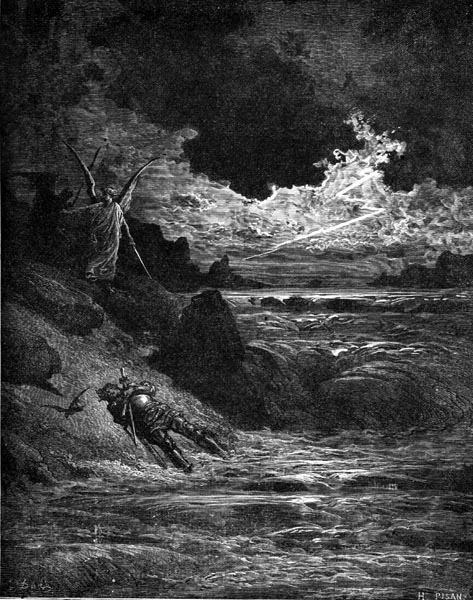
“…loosed the cross that my arms made on my chest, when pain overcame me.” (Purgatorio V: 123—125)
Purgatorio Canto V:130-136 Pia da Tolomei
A third spirit, followed on the second: ‘Ah, when you return to the world, and are rested after your long journey, remember me who am La Pia: Siena made me: Maremma undid me: he knows, who having first pledged himself to me, wed me with his ring.’
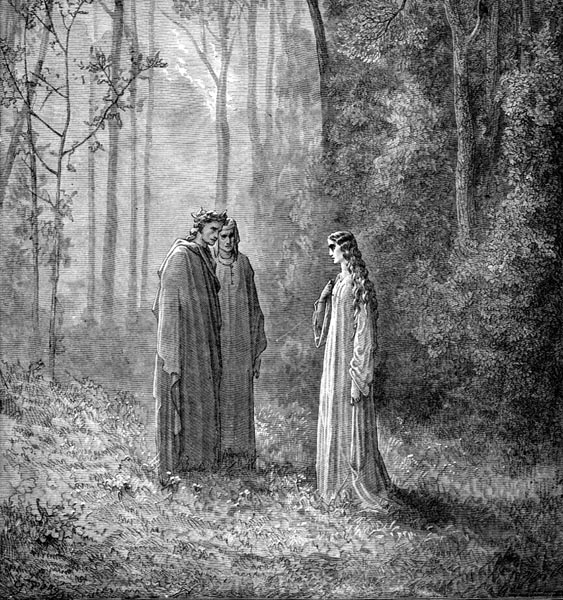
“…remember me who am La Pia.” (Purgatorio V: 130—132)
Purgatorio Canto VI:1-24 The spirits crowd round
When the gambling game breaks up, the one who loses stays there grieving, repeating the throws, saddened by experience: the crowd all follow the winner: some go in front, some snatch at him from behind, or, at his side, recall themselves to his mind. He does not stop, and attends to this one and that one. Those, to whom he stretches out his hand, cease pressing on him: and so he saves himself from the crush. Such was I in that dense throng, turning my face towards them, now here, now there, and freeing myself from them by promises.
There was Benincasa, the Aretine, who met his death by Ghin di Tacco’s ruthless weapons, and the other Aretine, Guccio de’ Tarlati, who was drowned as he ran in pursuit at Campaldino. Federigo Novello was there, praying with outstretched hands, and Farinata Scornigiani, he of Pisa, whose father Marzucco showed such fortitude on his behalf.
I saw Count Orso: and the spirit severed from its body through envy and hatred, and not for any sin committed, or so it said, Pierre de la Brosse, I mean. And here let Lady Mary of Brabant take note, while she is still on earth, so that she does not end with the viler crowd, for it.
Purgatorio Canto VI 25-48 Virgil on the efficacy of prayer
When I was free of all those shades, whose only prayer was that others might pray, so that their path to blessedness might be quickened, I began: ‘O, you who are a light to me, it seems that you deny, in a certain passage of your Aeneid, that prayer can alter Heaven’s decree: and yet these people pray only for this. Can it be they hope in vain? Or is your meaning not clear to me?’
And he to me: ‘My writing is clear, and, if you think about it rationally, their hopes are not deceptive, since the nobility of justice is not lessened because a moment of love’s fire discharges the debt each one here owes, and in my text, where I affirmed otherwise, faults could not be rectified by prayer, because prayer, then, was divorced from God.
Truly, you must not suffer such deep anxiety, unless she tells you otherwise, she, who will be the light, linking truth to intellect. I am not sure you understand: I speak of Beatrice. You will see her, above, on this mountain’s summit, smiling, blessed.
Purgatorio Canto VI:49-75 Sordello
And I said: ‘My lord, let us go with greater speed, since I am already less weary than before, and look the hillside casts a shadow now.’ He replied: ‘We will go forward with this day, as far as we still can: but the facts are other than you think. Before you are on the summit, you will see the sun return, that is hidden now by the slope such that you do not break his light.
But, there, see, a soul, set solitary, alone, gazes at us: it will show us the quickest way.’ We reached him. O Lombard spirit, how haughty and scornful, you were, how majestic and considered in your manner! He said nothing to us, but allowed us to go by, only watching, like a couchant lion. But Virgil drew towards him, begging him to show us the best ascent: though the spirit did not answer his request, but asked us about our country and our life.
And the gentle guide began: ‘Mantua,’… and the spirit all pre-occupied with self, surged towards him from the place where it first was, saying: ‘O Mantuan, I am Sordello, of your city.’ And the one embraced the other.
Purgatorio Canto VI:76-151 Dante’s speech on the sad state of Italy
O Italy, you slave, you inn of grief, ship without helmsman in a mighty tempest, mistress, not of provinces, but of a brothel! That gentle spirit was quick, then, to greet his fellow-citizen, at the mere mention of the sweet name of his city, yet, now, the living do not live there without conflict, and, of those, that one wall and one moat shuts in, one rends the other.
Wretched country, search the shores of your coastline, and then gaze into your heart, to see if any part of you is at peace. What use is it for Justinian to have renewed, the law, the bridle, if the saddle is empty? The shame would be less if it were not for that. Ah, race, that should be obedient, and let Caesar occupy the saddle, if only you understood what God has told you! See how vicious this creature has become, through not being corrected by his spurs, since he has set his hand to the bridle. O Albert of Germany, you abandon her, she, who has become wild and wanton, you, who should straddle her saddle-bow: may just judgement fall on your blood, from the stars, and let it be strange and obvious, so that your successor may learn to fear it, since you and your father, held back by greed, over there, have allowed the garden of the Empire to become a wasteland.
Careless man, come and look at the Montagues and Capulets, the Monaldi and Filippeschi: those who are already saddened, and those who fear to be. Come, cruel one, come and see the oppression of your nobles, and tend their sores, and you will see how secure Santafiora of the Aldobrandeschi is. Come and see your Rome, who mourns, widowed and alone, crying night and day: ‘My Caesar, why do you not keep me company?’ Come and see how your people love each other: and if pity for us does not stir you, come, and be ashamed, for the sake of your fame.
And, if it is allowed for me to say, O highest Jupiter, who was crucified on earth for us, are your just eyes turned elsewhere, or are you preparing some new good, that is completely hidden from our sight? For the cities of Italy are full of tyrants, and every peasant, that comes to take sides, becomes a Marcellus, against the Empire.
My Florence, you may well rejoice at this digression, which does not affect you, thanks to your populace that reasons so clearly. Many people have justice in their hearts, but they let it fly slowly, since it does not come to the bow without much counsel: yet your people have it always at their lips. Many people refuse public office: but your people answer eagerly without being called, and cry: ‘I bend to the task.’
Now be glad, since you have good reason for it: you who are rich, at peace, full of wisdom. If I speak truly, the fact will not belie it. Athens and Sparta that framed the ancient laws, and were so rich in civic arts, gave a mere hint of how to live well, compared to you, who makes such subtle provision that what you spin in October does not last till mid-November. How often in the time you remember, you have altered laws, money, offices and customs, and renewed your limbs! And if you consider carefully, and see clearly, you will see yourself like the sick patient, who finds no rest on the bed of down, but by twisting about, escapes her pain.
Purgatorio Canto VII:1-39 Virgil declares himself to Sordello
After the noble and joyful greetings had been exchanged three or four times, Sordello drew himself back and said: ‘Who are you?’ My leader answered, then: ‘Before those spirits worthy to climb to God were turned towards this Mount, my bones had been buried by Octavian. I am Virgil, and I lost Heaven for no other sin than for not having faith.’
Sordello seemed like someone who suddenly sees something, in front of him, that he marvels at, and believes, and does not believe, saying: ‘It is, is not,’ and he bent his forehead, and turned back, humbly, towards my guide, and embraced him as the inferior person does. He said: ‘O Glory of Latin, through whom our language showed its power, O eternal praise of the place from which I sprang, what merit or favour will you show me? If I am worthy to hear your words, tell me if you come from Hell, and from what circle.’
He answered him: ‘I came here, through all the circles of the mournful kingdom. Virtue from Heaven moved me, and with that I come. Not for the done, but for the undone, I lost the vision of the high Sun, you seek, and who was known too late by me. Down there, there is a place not saddened by torment, but only darkness, where the grief does not sound as moaning, only sighs. There, I am, with the innocent babes, who were bitten by the teeth of death, before they were baptised and exempt from human sin. There I am, with those who did not clothe themselves with the three holy virtues, Faith, Hope and Charity, but without sin, knew the others and followed them all.
But if you know, and can, give us some indication of how we might come most quickly to the place where Purgatory has its true beginning.’
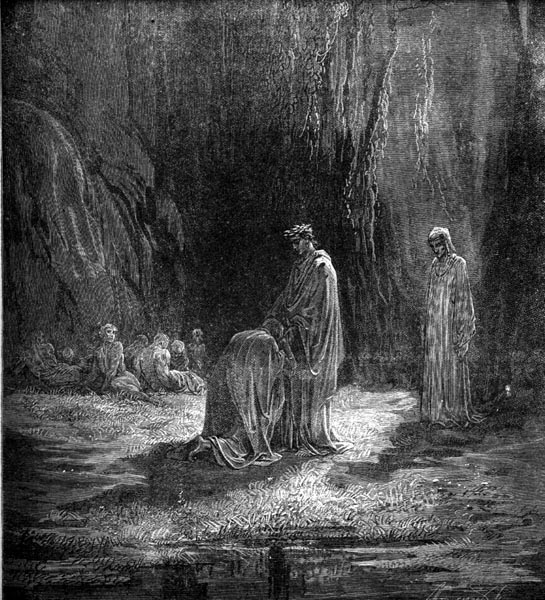
“‘I came here, through all the circles of the mournful kingdom.’” (Purgatorio VII: 21—23)
Purgatorio Canto VII:40-63 Sordello explains the rules for ascent
He answered: ‘No fixed place is set for us: I am allowed to go up and round: I act as guide, beside you, as far as I may go. But see now how the day is declining, and we cannot climb by night, therefore it would be well to think of a good place to rest. Here are some spirits, on the right, apart: if you allow me I will take you to them, and they will be known to you, not without joy.’
Virgil replied: ‘How is that? Would he who wished to climb by night be prevented by others, or would he not climb because he could not?’ And the good Sordello drew his finger along the ground, saying: ‘See, you could not even cross this line after sunset, not because anything other than the darkness of night hinders you from going upwards, which obstructs the will through the will’s powerlessness. Truly, you could return downwards at night, and walk, straying, along the mountainside while the horizon shuts up the day.’
Then my lord, as if wondering, said: ‘Take us, then, where you say we might have joy in resting.’
Purgatorio Canto VII:64-136 The Valley of the Negligent Rulers
We had gone a short distance, when I saw that the mountain was scooped out, in the way that valleys are hollowed out here. The shade said: ‘We will go there, where the mountainside makes a cradle of itself, and wait for the new day. The winding track, that led us to the side of the hollow, there where the valley’s rim more than half-fades out, was neither steep nor flat. Gold and fine silver; crimson and white cloth; bright, clear Indian wood; freshly mined emerald at the moment it is split; would all be surpassed in colour by the grass and flowers, set inside that fold of ground, as the lesser is surpassed, by the greater.
Not only had Nature painted there, but had made there, one unknown and indefinable perfume, from the sweetness of a thousand scents. There I saw souls, sitting among the grass and flowers, singing Salve Regina, who could not be seen from outside, because of the valley’s depth.
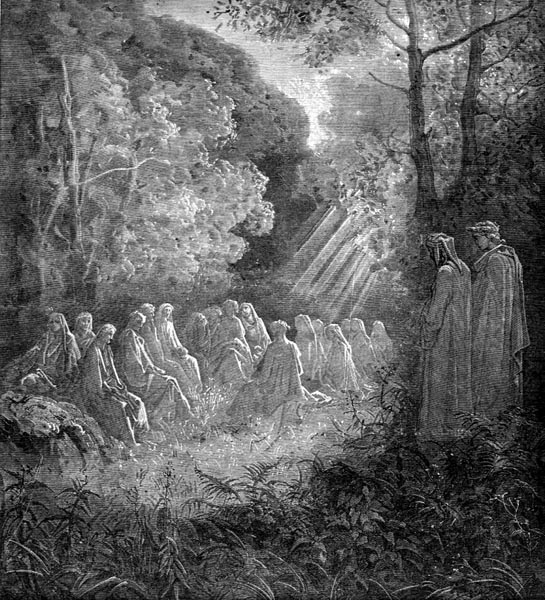
“There I saw souls, sitting among the grass and flowers, singing Salve Regina, who could not be seen from outside, because of the valley’s depth.” (Purgatorio VII: 82—84)
The Mantuan, who had led us aside, began to speak: ‘Do not wish me to lead you among them, before the little sun sinks to its nest. You will see the faces and actions of them better from this terrace, than if received among them down in the valley.
He who sits highest, and has the aspect of having left undone what he should have done, and does not move his lips to the others’ singing, was the Emperor Rudolph, who might have healed the wounds that meant Italy’s death, so that she is helped, too late, by another. The next, who seems to be comforting him, ruled Bohemia, the land where the water rises that the Moldau carries down to the Elbe, and the Elbe to the sea. He was named Ottocar, and, even in his swaddling clothes, was far better than bearded Wenceslas his son, whom lust and sloth consume, .
And that snub-nosed one, Philip the Third, who seems so deep in counsel with, Henry of Navarre, who has so kindly a manner, died fleeing, and withering the lily: look at how he strikes his chest. See, the other, sighing, has made a rest for his cheek with the palm of his hand. They are the father and the father-in-law of Philip the Fair, the plague of France: they know his wicked and sordid life, and from that the grief comes that so pierces them.
He who seems so stout of limb, Peter of Aragon, who blends his singing with Charles of Anjou, him of the prominent nose, was cinctured with the cord of every virtue. And if the young man, who sits behind him, had remained king after him, the worth would have flowed from vessel to vessel: which may not be said of his other heirs. James and Frederick have the kingdoms: but no one has the better heritage. Human worth rarely increases through its branches: and this He wills who creates it, so that it may be asked for of him.
My words apply to Charles, the large-nosed one, as well, no less than to Peter the other, who sings with him: because of his son Apulia and Provence now groan. So is that plant more degenerate in its seed, by as much as Constance, Peter’s wife, still boasts of her husband, more than Beatrice or Margaret do of the other.
See the king of the simple life, sitting there alone, Henry the Third of England: he had a better increase in his branches. That one, looking up, who humbles himself lower among them, is William the Marquis of Montferrat, because of whom the town of Alessandria, in Piedmont, and its war, made Montferrat, and Canavese, weep.